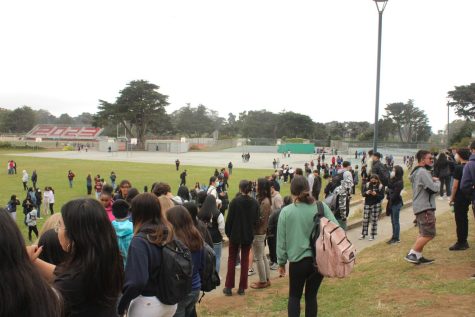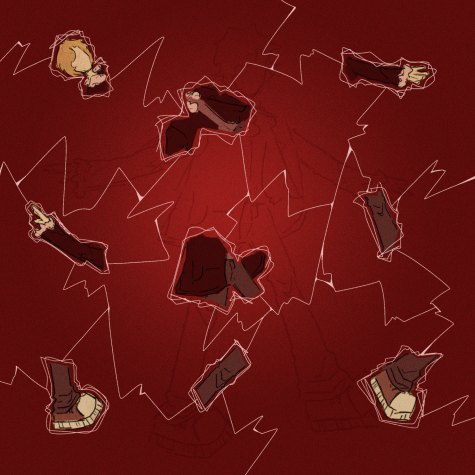Underrepresented students need administrative support
When freshmen students are thrown into the crowded hallways at Lowell, some feel small among the 75 percent Asian and White students. The disproportionately low representation of students with Black and Latinx backgrounds render them unable to easily find a sense of community at school. To address this, the support programs African American Common-Core Education Support Group (AACES) and Latino Equity Achievement Program (LEAP) were created through the leadership of former principal Andrew Ishibashi to provide in-depth mentorship and academic aid. Today, nearly a decade later, administrative support for these programs has diminished to the point where they are at the cusp of extinction. For the sake of these struggling Black and Brown students, Lowell’s administration needs to center more attention on AACES and LEAP.
For students that are involved in LEAP and AACES, they’ve been successful in finding comfort through a small community that celebrates a similar heritage. These affinity groups help create meaningful connections between students, bolster their academic performance, and build familiarity with the student body. Through LEAP, Latinx underclassmen are welcomed by other Latinx student mentors and are encouraged to socialize with their peers, under the supervision of Program Coordinator Christian Ferrey. Similarly, AACES allows Lowell’s Black community to take advantage of scholarship opportunities and receive school support from Program Coordinator Timothy Gray. As students build friendships and a better appreciation for their culture, these programs help bridge the gap of unfamiliarity in the Lowell community.
When principal Ishibashi was in charge, he made it a priority to aid Lowell’s disadvantaged communities through these programs. Ishibashi was able to do so through the frequent meetings he held with each program’s coordinators and the sufficient funding he designated to LEAP and AACES. “In the past when Ishibashi did it, he would meet with [coordinators] regularly to set up goals and ideas, and give guidance,” college counselor Maria Aguirre said. “These programs were like Ishibashi’s babies — he was the one that envisioned them, so he put people in place and gave them guidance as far as what to do for students.” Following his departure from Lowell in 2019, the administrative support that LEAP and AACES once had, decreased.
The constant restructuring of administration, including three new principals in the past four years, has meant that these programs have not been sustained thoroughly or consistently since 2019. Since the departure of Ishibashi, the incentives and instructions to preserve LEAP or AACES have not been passed along the line of principals. Currently, these support programs no longer have regular meetings with administration, clear funding, or coordinators with enough of a bandwidth to lead them. Ferrey said that the administration’s recent hecticness and his workload led to his initial uncertainty of LEAP’s existence this school year. “It hasn’t been a priority for not just the administration, but us too,” he said. “And to be honest, I didn’t even know if I was going to receive any funding this year for LEAP,” Ferrey said. Without the support, the programs were unable to host their yearly cultural events or even split the duties to other possible adult sponsors at Lowell.
Additionally, distance learning during the COVID-19 pandemic put a pause on the AACES program in the 2020-2021 school year, making it difficult for many Black students to receive academic or emotional support through them. “[The pandemic] definitely put a block to the progress we were making with AACES, and everything kind of got off target,” Gray said. He feels that the pandemic took away a crucial year for many Lowell students, as a year of inactivity has meant that most students are now not even aware of the programs. The affinity groups resumed last fall, but they continue to receive little attention from the administration. As a result, AACES and LEAP remain invisible to struggling students.
With the administration turning its back on LEAP and AACES, many upperclassmen have taken matters into their own hands. Despite their busy schedules, they’ve committed themselves to helping underclassmen within the programs themselves. At times, upperclassmen in LEAP prepare future meetings regarding how to help their mentees academically, without the attendance of their adult sponsor. Since carrying the weight of aiding underclassmen in a minimally supervised space, the upperclassmen feel overwhelmed. In the case of LEAP, members are no longer meeting at all.
Black and Latinx students remain sunken in an ominous ocean of disproportionate demographics and lack of support. Many are exhausted from holding onto LEAP and AACES for dear life. These affinity groups have allowed students to reconnect with their community and opportunities to excel academically with the aid of their coordinators. It is imperative that the Lowell administration aids these diminishing programs through more funding and giving guidance by holding meetings with students and advisors. The power to build a future of inclusivity and community at Lowell rests in the hands of administrators, and to achieve that, they must understand the first step: recommitting themselves to the LEAP and AACES programs.








